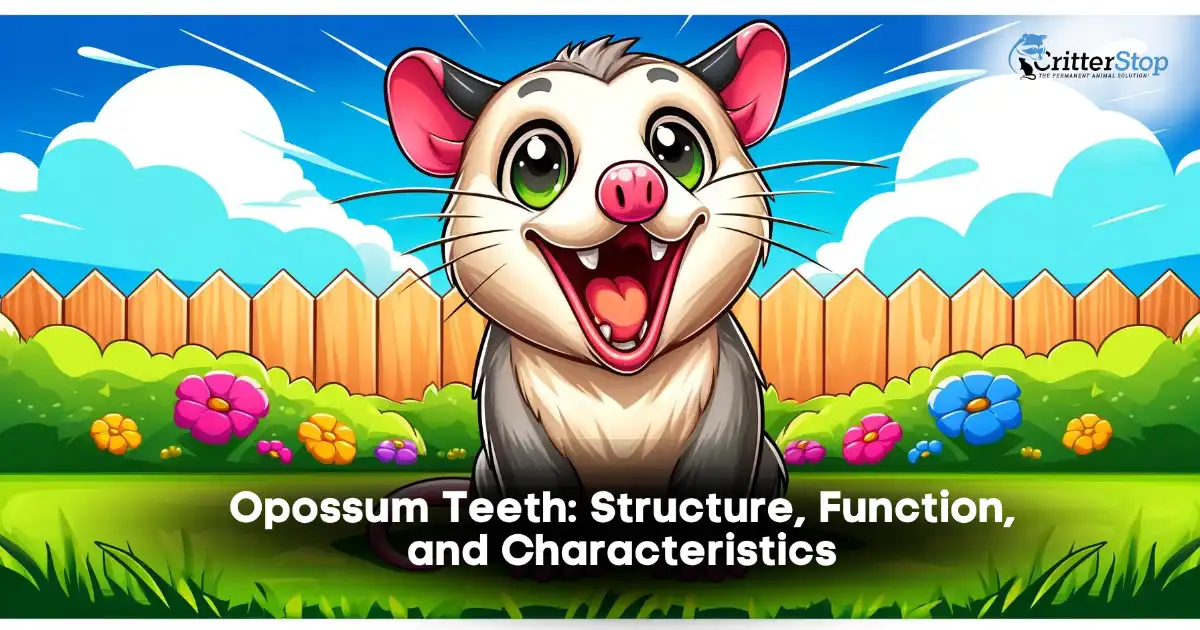
Opossums are fascinating creatures with a unique set of teeth that set them apart from other mammals. Among biologists and animal enthusiasts alike, a topic of interest is often their teeth. Opossums have 50 teeth in total, which is more than any other North American mammal.
One of the most interesting things about opossum teeth is that they have 18 incisors, which is more than any other mammal. When eating, these incisors are used to hold onto and grasp food. The incisors are also sharp enough to pierce through the skin of fruit and other tough materials. In addition to their incisors, opossums also have sharp canine teeth that are used for self-defense and hunting prey.
Opossums are unique in that they have a dental formula that is different from other mammals. Their dental formula is 5/4, 1/1, 3/3, 4/4, which means they have five incisors on the top and four on the bottom, one canine on each side of the jaw, three premolars on each side, and four molars on each side. This unique dental formula allows opossums to eat a wide variety of foods, including fruits, insects, and small animals.
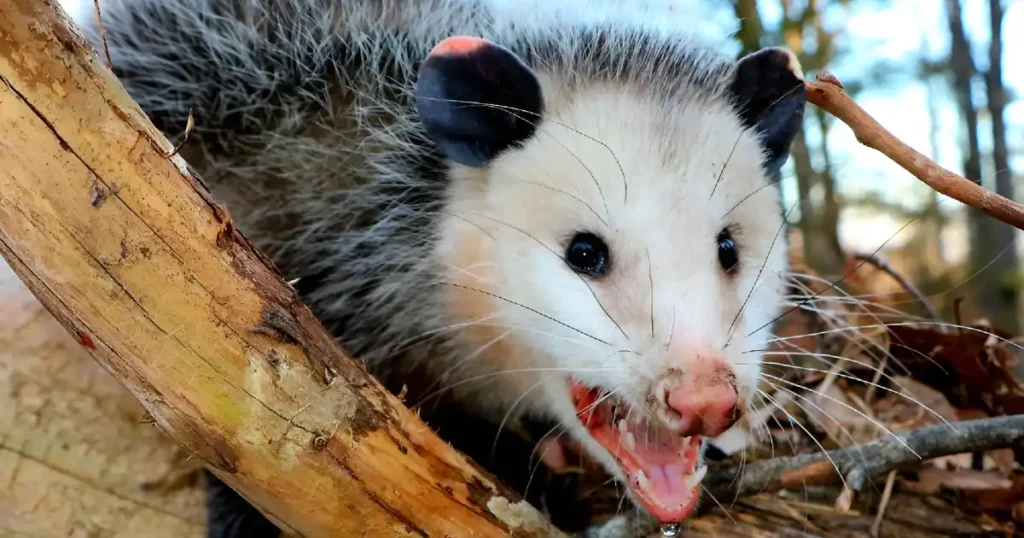
Opossums are known for their sharp teeth, which are essential for their survival in the wild. Opossum teeth are unique in many ways, and understanding their anatomy is crucial to understanding their behavior and diet.
Opossums have more teeth than any other North American mammal with a total of 50 teeth. These teeth are divided into three types: incisors, canines, and molars.
The incisors are the front teeth, and there are a total of 10 in an opossum's mouth. Biting and cutting food is what these teeth are used for. To tear flesh, opossums use the sharp, pointed teeth known as the canines. Opossums have four canines, two on the top and two on the bottom.
The molars are the back teeth, and there are a total of 36 in an opossum's mouth. To grind and crush food, opossums use these teeth. The molars have a complex surface that allows opossums to efficiently break down tough plant material and small bones.
Opossums have a unique dental formula, which is the number and arrangement of their teeth. The dental formula for opossums is 5/4 1/1 3/3 4/4, which means they have five incisors, one canine, three premolars, and four molars on each side of their upper and lower jaws.
Opossums also have a unique tooth replacement pattern. Unlike most mammals, opossums continuously replace their teeth throughout their lives. When a tooth falls out or is damaged, a new tooth grows in its place.
In conclusion, opossum teeth are a fascinating and important aspect of their anatomy. Their teeth are uniquely adapted to their diet and behavior, and understanding their dental formula and tooth replacement pattern can provide insight into their biology.
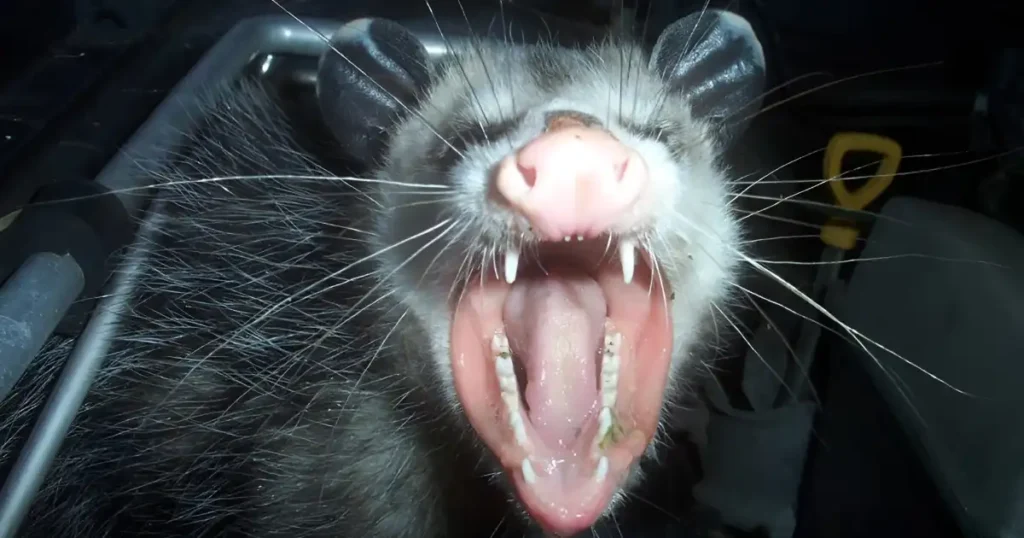
Opossums have more teeth than any other North American land mammal, as they have 50 teeth. As their teeth are designed for biting and tearing, they are sharp and pointy. However, like any other animal, opossums can experience dental problems. One of the most common issues is tooth decay, which can be caused by a diet high in sugar or poor dental hygiene. Tooth decay can lead to pain, infection, and even tooth loss.
Another common dental issue is broken or chipped teeth. Opossums are known for their ability to play dead, and sometimes they can injure their teeth during this process. Chipped or broken teeth can be painful, thus making it difficult for opossums to eat.
To prevent dental issues, it is important to take care of opossums' teeth. Opossums can maintain their dental health by eating a balanced diet that is low in sugar. In addition, opossums should have access to fresh water at all times to help rinse away food particles.
Regular dental check-ups are also important for opossums. A veterinarian can examine their teeth and identify any issues before they become more serious. If necessary, a veterinarian can perform a dental cleaning or extraction to help improve the opossum's dental health.
In conclusion, opossums have unique teeth that are designed for biting and tearing. But they can experience dental problems just like any other animal. With a balanced diet and access to fresh water, opossums can maintain good dental health.
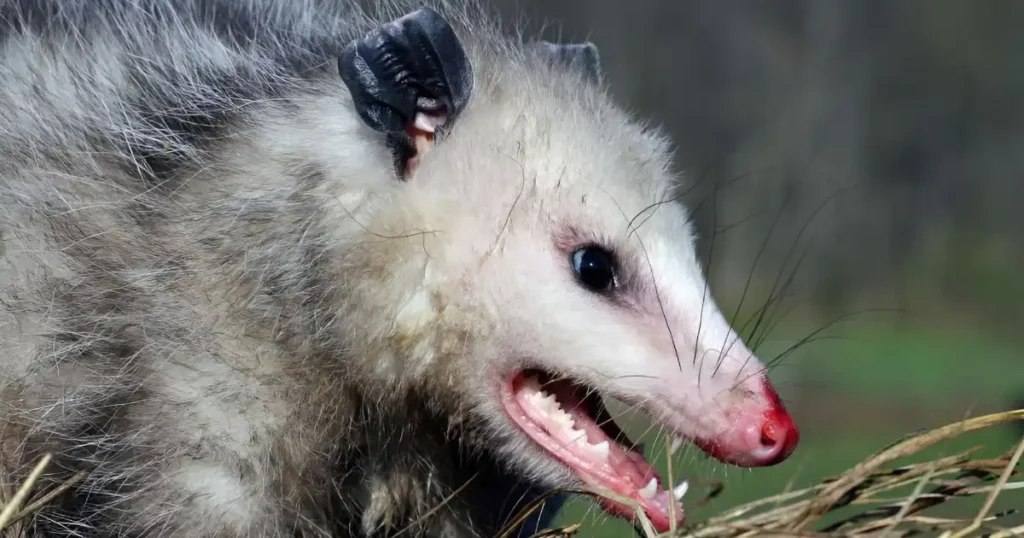
Opossums are omnivorous animals and their teeth are adapted to their varied diet. They have more teeth than any other North American mammal, and their dental formula is unique among marsupials. Their incisors are sharp and their canines are long, which allows them to capture and kill prey. Their molars and premolars are designed to grind and crush plant material.
As opportunistic feeders, opossums will eat just about anything they can find, including insects, small animals, fruits, vegetables, and carrion. They have a unique adaptation called "playing possum" where they feign death when threatened. This adaptation is thought to have evolved as a way to deter predators from attacking them, as many predators prefer to eat live prey.
While opossums are not aggressive animals, they will defend themselves if they feel threatened. Despite being known as vicious biters, this is largely a myth, as opossum bites are not usually very serious. However, diseases such as rabies can be carried by them, so it is important to avoid contact with them.
When threatened, opossums will often hiss and bare their teeth as a warning. If this does not deter the threat, they may bite or scratch. Opossums have a unique adaptation where they can open their mouths very wide, which allows them to bite their attackers without having to get too close. This adaptation is thought to have evolved as a way to protect their vulnerable faces from predators.
In conclusion, opossums have unique teeth that are adapted to their omnivorous diet and defensive behavior. While they are not aggressive animals, they will defend themselves if threatened and their bites can carry diseases. It is important to give these fascinating animals their space and avoid contact with them whenever possible.
No one wants to deal with opossum bites, which are always a danger when dealing with opossums that have invaded your home. If this is a problem you’re facing, your best bet is always to hire a wildlife removal professional, and Critter Stop is here to help! We are a humane wildlife removal company that services residential & commercial customers in Texas that has a five-star reputation and offers industry-leading guarantees. Contact Us now at (214) 234-2616 and book a free inspection and estimate today.
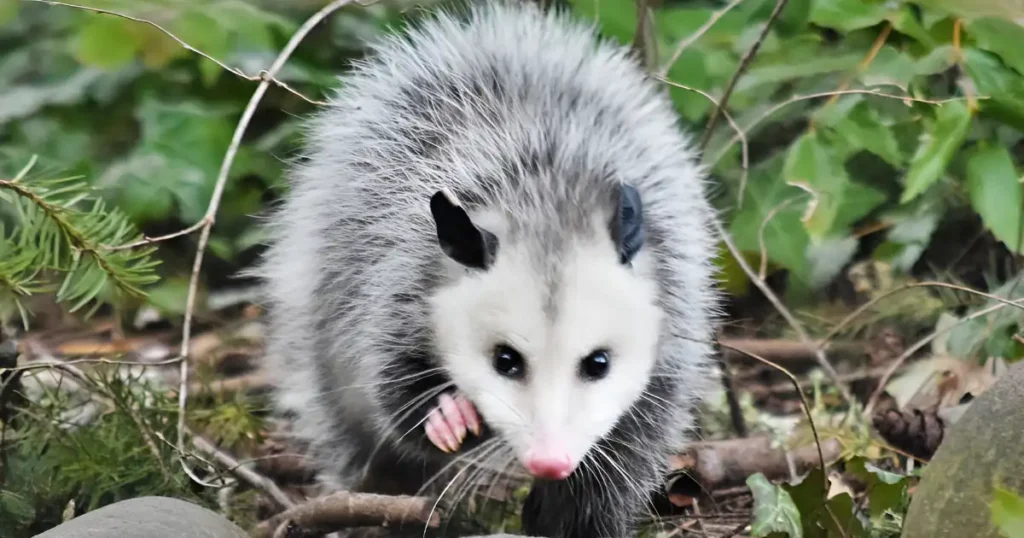
Opossums are generally non-aggressive animals and will only bite if they feel threatened or cornered. Their bites are not known to transmit any diseases to humans and they are not venomous. However, it is still important to seek medical attention if bitten by an opossum, as with any animal bite.
Opossums have 50 teeth in total, which is more than any other North American mammal. They have 18 small teeth in their front jaw and 32 teeth in their back jaw.
Opossums have sharp, pointed teeth that are adapted for their omnivorous diet. Their teeth are also very strong and can withstand the force required to crack open hard-shelled prey, such as nuts and seeds.
Opossum teeth vary in size depending on their location in the mouth. Their front teeth are small and pointed, while their back teeth are larger and flatter. The largest teeth are their four canine teeth, which can stretch up to 1 inch in length.
Opossums and raccoons have similar dental structures, with both having 50 teeth in total. However, opossums have more teeth in their front jaw and fewer teeth in their back jaw compared to raccoons.
There is no significant difference between the teeth of male and female opossums. Both sexes have the same number and type of teeth.
Visit our Critter Library and learn more about our furry friends